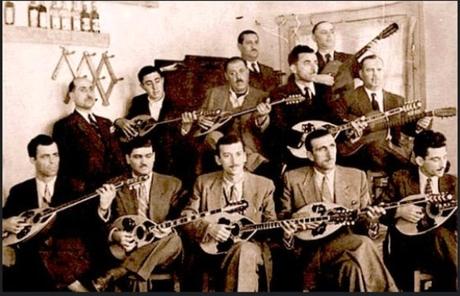When Adele and I visited Kefalonia four summers ago, we attended a concert of traditional Greek music at the Municipal Theatre in Argostoli - and what a magical night it was, consisting of traditional Greek instruments and kantades or 'folk' songs performed by some of the leading exponents and legends of the genre.
There are over twenty traditional Greek instruments (many being fore-runners of our modern percussion, string and wind instruments) with wonderful names like askaulos, barbitos, bouzouki, kanonaki, kithara, laouto, lyra, outi, phorminx, sambyka, tamboura and tympanon. A good many were called into action on that night in Argostilo and they provided a musical accompaniment to some truly wonderful singing; a rich cultural tradition dating back hundreds of years but still thriving.

serious rhapsody in progress
When we got back to England, I tracked down a 2CD set of forty-two digitally restored recordings of instrumental Greek music (some dating back to 1905, the most recent 1956) drawn from a variety of sources including old field recordings and 78rpm records. Appropriately enough, it is named after its title-track, 'Greek Rhapsody' (playing in the background as I type this blog); two and a half hours of fabulous ethnic music - best enjoyed with a good meze and chilled retsina.In strictly mainstream terms, during the last two centuries in Western classical music, a rhapsody has come to mean something episodic yet integrated, free-flowing in structure, featuring a range of highly contrasted moods, color and tonality, and giving a sense of spontaneous invention. Bartok, Debussy, Gershwin, Liszt, Rachmaninoff and Ravel have all written rhapsodies. And as well as colours (Blue, obviously, but also Red, White, Green) there are geographies in addition to Greek, most notably Bulgarian, Hungarian, Norfolk, Romanian, Spanish and Welsh Rhapsodies. (I believe there is even a Bohemian one!)
The challenge I've set myself for Greek week, and as trailed in another recent blog, was to 'reverse-engineer' the attributes of contemporary musical rhapsody into some Greek-themed poetry, and so here's one I sewed together earlier; (standard T&Cs apply: work subject to extension or revision as imagination deems fit).

sunrise at Olympia
By heck, it's a bit of an epic, but here goes.Rhapsode
What? Do you lie drowsy still
in your perfumed bed of love,
even as the crested lark sports
sprightly above with bright Eos
goddess of the roseate dawn?
There is a far more fitting time
when evening grows to shade
for you to enjoy the charms
of that olive beauty folded softly
in your arms; so stir now poet,
leave her be and greet the day
with some alacrity. Take no bowl
of resin wine at breakfast, for
a clear head is required to sire
a new work worthy of the Fete.
Your duty, to compose an ode
to celebrate your island king
and all his allies on their return
from doing righteous battle
with an upstart neighbor. Think
how to honor brave Lykomenes
who brought home spoils to share,
cattle, women, honey, spears,
just deserts and peace of mind
thanks to the gracious gods who
favoured Samothrace over Icaria,
then charmed the mighty sea
so to allow safe passage home.
Name the deities by epithet in turn
along with all who fought to win
a famous victory on foreign soil.
Declaim also their lineage, along
with the deeds of their forebears
until you have a weighty song.
Recite to ensure word-perfection
for when libations have been poured
upon the sands and maidens
have performed their sensual
dithyrambic dance, then all eyes
turn to you, he who sews odes.
Take up your myrtle-staff, raise
high that voice and sing beguiling
tales of mortals and their gods,
blood of the house of Kronos
flowing proud in every king's breast
as they betake of the victory feast,
refill their bowls with sparkling wine
rejoicing in the telling of their glory.
Your efforts rhapsode will be
well rewarded in the coin of posterity.
Thanks for reading, S ;-) Email ThisBlogThis!Share to TwitterShare to Facebook
Reactions:
